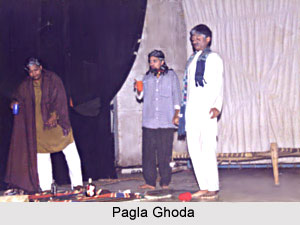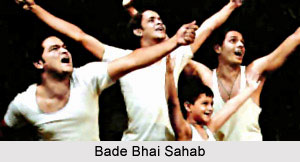 Bengali play has a historic journey as it boasts the copious tradition of Indian theatre whilst unfolding the rich folklores of India. With its root associated with Jatra, Bengali plays have witnessed colossal modification. The journey was started back in the year 1795 with the Bengali translations of two English comedies, `Disguise` and `Love is the best doctor` in Kolkata. However, it is with the scaffolding of the translated plays of the works of William Shakespeare, Bengali plays for the first time gained that shape to befit the urban taste. Gone are the days of Sanskrit language dramas; the larger than life image also gradually faded away and with the advent of 19th Century Bengali plays were widely translated and adapted to befit the requirement of the Indian psyche
Bengali play has a historic journey as it boasts the copious tradition of Indian theatre whilst unfolding the rich folklores of India. With its root associated with Jatra, Bengali plays have witnessed colossal modification. The journey was started back in the year 1795 with the Bengali translations of two English comedies, `Disguise` and `Love is the best doctor` in Kolkata. However, it is with the scaffolding of the translated plays of the works of William Shakespeare, Bengali plays for the first time gained that shape to befit the urban taste. Gone are the days of Sanskrit language dramas; the larger than life image also gradually faded away and with the advent of 19th Century Bengali plays were widely translated and adapted to befit the requirement of the Indian psyche
By the mid 19th century the cultured and affluent young Bengalis of Calcutta started contributing in Indian theatre by writing Bengali plays whilst encasing the natya and rasa of Bengali theatre with Raaga, tana, lasya, and finally with light Indian songs and dance. Geetinatya as it has been reckoned, thawed a million heart in the then Bengal. It is around this time, Tagore`s Raktakarabi (Red Oleanders) and Raja (The King of the Dark Chamber) were hugely appreciated.
Free and random adaptation from Greek, French and English sources further supported Bengali plays in assimilating the western ideas. Not only adapted plays but historical plays, mythological plays and also the social plays contoured the Bengali plays whilst making it a distinct art form of expressing ideas. The contemporaneousness was sown during that era. However, this seed of contemporary treatment, which was sown later, gained maturity as slowly Bengali Play, became a media of protest against the British Raj. In the hands of the famous Bengali theatre personalities like Girish Ghosh, Dinabandhu Mitra Bengali theatre ideally illustrated the colonial socio political issues. The Bengali plays soon became the strong medium of expression on social, political and contemporary issues of relevance to the common Indian. Naba Natak, which opposed polygamy, Nildarpan which criticized the British indigo planters for their sheer exploitation of the Indian farmers are some of the early efforts of protesting against the colonial rule. As a matter of fact that Bengali theatre had such an effect in depicting the socio political issues in British India that even the Britons perceived it as a potential threat to their Empire, if left unchecked
 The facet of Bengali plays changed a lot with the independence of India. It is then Bengali theatre witnessed a massive change in its stylistic approach. Bengali plays were no more a media for entertainment but was lot more. The Major productions in Bengali theatre then concentrated mainly in exemplifying the socio-political and economic conditions of independent India The leftist movement, the political scenario, the burning questions of unemployment all found an answer in the varied Bengali plays after independence. One such production was the Evam Indrajit. A perfect presentation of Badal Sircar, Evam Indrajit is the eloquent projection of fears, tears and frustration of the cultured bourgeoisie of the early 60s. The play ends yet the tunes hangs. With its artistic articulation and with its burning questions Evam Indrajit is reckoned as a milestone in the history of Bengali theatre.
The facet of Bengali plays changed a lot with the independence of India. It is then Bengali theatre witnessed a massive change in its stylistic approach. Bengali plays were no more a media for entertainment but was lot more. The Major productions in Bengali theatre then concentrated mainly in exemplifying the socio-political and economic conditions of independent India The leftist movement, the political scenario, the burning questions of unemployment all found an answer in the varied Bengali plays after independence. One such production was the Evam Indrajit. A perfect presentation of Badal Sircar, Evam Indrajit is the eloquent projection of fears, tears and frustration of the cultured bourgeoisie of the early 60s. The play ends yet the tunes hangs. With its artistic articulation and with its burning questions Evam Indrajit is reckoned as a milestone in the history of Bengali theatre.
Another remarkable presentation is Pagla Ghoda. 70`s tradition, tears, pain and frustration is ideally staged through this play. This particular play is also important not just as a play but as an instigator of a new concept of Modern Indian theatre. The anti establishment attributes of Pagla Ghoda later contoured the Indian street theatre movement and is therefore reckoned as one of the masterwork of the great theatre personality- Badal Sircar.
List of Bengali Plays
| Jaha Chai presented by Nandikar direction Rudraprasad Sengupta & Goutam Haldar | Chokh Gyalo - Written by Tarashankar Bandyopadhyay, Direction Goutam Haldar, presented by Nandikar | Dulia - Written by Leela Mazumdar, direction Swatilekha Sengupta & Goutam Haldar | Brechter Khonje - A centenary tribute to Brecht by Nandikar | Fasad, - The Problem By Paribartak |
| Barda - Based on Munshi Premchand`s story Bade Bhai Sahab, Direction Goutam Haldar | Bappaditya - Written by Abanindranath Tagore, direction Goutam Haldar and presented by Nandijar | Andharmoni - Written by Leela Mazumdar, direction Swatilekha Sengupta & Goutam Haldar | Ekdin Rattire - One Day in The Night By Paribartak | `Daak Naam Bile – by Bhashkar Nattodol |




